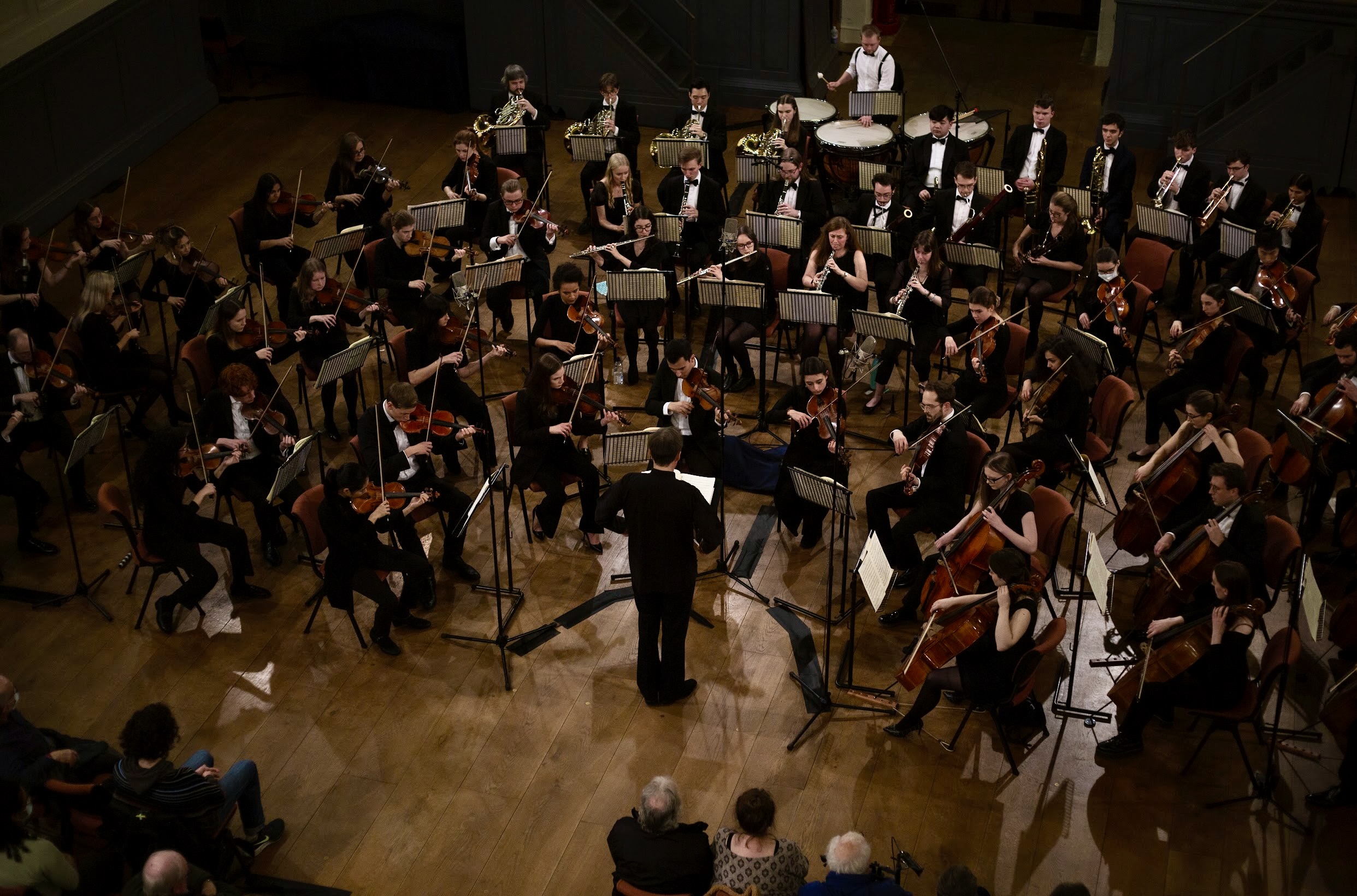Last term, I went to see Oxford Millennium Orchestra perform their Michaelmas term concert at the Sheldonian. Billed as the headline, with soloist Magdalena Filipczak, was Bruch’s Violin Concerto No. 1. This was supported by Beethoven’s Egmont overture and Schumann’s Symphony No. 3.
Out from the November night an easy orange glow invited me into the Sheldonian. I trotted up creaking stairs to the top floor, into the jaws of death – the jaws of death being an archaically unintuitive seating set up. The seats on the upper stalls are just three big steps – if you arrive late, sidling along the upper rows in front of those already seated requires deft footwork and a lot of “excuse me”s.
The night began with Beethoven’s Egmont Overture. It was a bracing musical introduction, serving its purpose as an overture, with bold themes easily latched upon by the audience. Composed for the 1788 play of the same name by Johann Wolfgang von Goethe, the piece is interesting merely for its connection to two German luminaries. Yet Beethoven’s reputation was not earned by chance; the Egmont overture, with muscular themes and compelling structure, simmers and sweeps and soars.
Goethe’s play describes the life of Count Egmont, a heroic sixteenth-century Dutchman who refuses to give up his liberty despite the threat of arrest from the Spanish. The orchestra conveyed this drama and heroism, playing with eager conviction – tense strings and flowing woodwind melodies leapt out under Adrian Adlam’s tight and economic conducting.
When Egmont finished, soloist Magdalena Filipczak emerged to healthy applause. The audience would soon discover that this applause was not only rightly deserved, but should have been louder. The Bruch Violin Concerto no. 1 seized the ears from its opening strains. Filipczak played with haunting clarity; the meandering violin melodies sizzled against the orchestra’s deeper texture. The instrument she played that night was of note – dated from the 1720s, crafted by famed luthier Antonia Stradivari. Violins made by Stradivari are considered to be among the finest ever made; only musicians of significant repute will ever have the resources and support to be able to play one.
In incompetent hands, a Stradivarius will sound as dull as a charity-shop violin. It was the skill and vivacity of Filipczak’s playing that brought the concerto to life. Icily capricious runs and howling high notes reflected not just of the virtuosity of a professional but the hunger and earnestness of youth. It was exhilarating to be in the audience and hear this liberating three-way conversation between player, conductor and soloist. It seemed that each member of the orchestra was responding with their very best to Filipczak’s electric lead.
The concerto begins with drama; a hushed orchestra swells and softens against the barbed but melodious line of the principal violinist. This moves without break into the second movement, whose singing melody stands out as a highlight of the piece. The third movement buzzes with a dancing, skipping opening theme, returned to throughout, each time with increased vigour and movement. It ends in loud and exuberant style.
When the violin concerto finished, the audience broke out into unrestrained applause. Around the room people glowed with the excitement that comes after a great performance. Filipczak bowed, walked off, walked back on, bowed again, and walked off. Then she walked back on again, this time poised to play something more. She announced to the audience that she would play a piece by composer Grażyna Bacewicz – Polish Capriccio for solo violin. Filipczak drew special attention to Bacewicz being female, standing out among an otherwise all-male cast of composers. It is always worth reiterating, for the sake of our own vigilance, the tragedy ubiquitous among the arts that historic representation of non-male artists remains so poor.

The Polish Capriccio, brief as it was, deserves a special mention. Played with all the fire and wit that she gave to the concerto, Filipczak delivered this high-spirited Polish tune convincingly. The audience, perhaps tentative to begin at the prospect of a piece few had heard of, were all applauding unreservedly when it finished.
With that, Magdalena Filipczak walked off for the last time. After the interval, the audience came back to hear Schumann’s Symphony No. 3. However, it felt as though some of the energy of the orchestra had walked off along with Filipczak. The symphony, grand and rarefied though it is, was simply outshined by the preceding performance. Throughout the symphony’s long five movements, it was a struggle to hear it as anything more than a footnote to what had come before. There were occasional flashes of excitement, but the orchestra seemed lethargic. Whether this was from fatigue after a long concert, or the lack of a unifying soloist, was unclear. After the end, conductor Adrian Adlam, speaking a few words about the music, called the Schumann symphony “the great work of the night”. Wherever this greatness lay, it had not been realised in the Schumann the way it had been in the Bruch.
Nevertheless, for an orchestra made up entirely of students, which rehearses only once a week, it was an impressive concert. The evident dedication that each member of the orchestra had put into the music, on top of demanding degrees, is admirable. Adlam had a word or two to say about this; in his closing speech he exalted the students for their cross-disciplinary skill. He seemed particularly enamoured by STEM subjects – presumably the most foreign to a disciple of music – speaking reverently about those studying “physics” or “biomedicine”. It was a touching admission of humility from the conductor, and ended the evening on a tone of good faith. I left satisfied.
Image Credit: Oxford Millenium Orchestra



